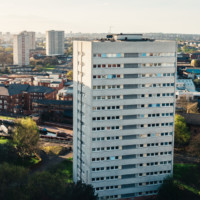
In its ‘Building Safety: Remediation and Funding’ report, the cross-party committee said too many leaseholders were falling through the cracks of the government’s “piecemeal measures”.
Earlier this year, the government proposed that developers and manufacturers should pay for the remediation of buildings between 11 and 18 metres tall. It also asked developers to fund and undertake works on buildings they are responsible for.
It said leaseholders would be exempt from costs to fix unsafe cladding and proposed a £10,000 cap on non-cladding costs or £15,000 for those in London. In its plans, landlords with one additional property will also be exempt from paying, meaning portfolio landlords could have to pay towards works.
The report said leaseholders, buy-to-let landlords and leaseholders of buildings under 11 metres in height were not to blame for the crisis.
It asked the government to scrap the cap on non-cladding costs and instead of applying a “piecemeal” method of funding depending on building height and type of defect, to implement its previously recommended Comprehensive Building Safety Fund.
It said the fund would cover costs of all buildings where the responsible party cannot be traced.
Estimated costs
The committee emphasised that in order to know how much money will be needed to remediate buildings, the government needed to know how many properties were impacted. As the publicly available data only covers properties above 18 metres, the committee said this provided a “partial picture” of the issue.
Although the government has asked the industry to provide data on the buildings they are responsible for, the committee said it was “baffled” that “hardly anyone seems to be able to share with us the calculations that they have made of the number of buildings affected, or by building height or type of defect”.
Currently, it is estimated that it will cost £5.1bn to remediate cladding on buildings 18m and above, and £4bn to remediate cladding on buildings 11–18m high.
The committee said it was “unacceptable” that the exact number of affected buildings was not known and called for the government to publish the information it does have within two months.
Responsible parties
In relation to the government’s ‘polluter pays’ proposal, the committee said developers and manufacturers were not the only ones who contributed to the building safety crisis.
It said: “In addition there are difficulties in holding some responsible companies to account as they are based overseas. Governments also share responsibility for the building safety crisis on account of their regulatory failings.”
It asked for all responsible parties to be identified and made to pay a contribution to remediation, such as product suppliers, installers, contractors, and subcontractors. The committee also asked for insurers to contribute as they would have covered the costs of developers who did not comply with safety rules yet have since increased premiums despite works being carried out.
It also proposed that the government holds overseas developers to account.
Protecting leaseholders and exempt parties
The committee said while the government has promised to protect leaseholders from future costs, it has not made any commitments to people who have already paid for works.
Currently, any costs paid so far will count towards the proposed cap on non-cladding expenses including waking watch fees, insurance premiums are not included.
The committee said: “As they stand, the government’s proposals create a bizarre lucky dip in which some leaseholders may see their costs capped at £10,000 (£15,000 in London); some, because they have not yet paid for cladding remediation, may pay nothing at all; and others, who have already paid for cladding remediation, will have paid well in excess of the proposed non-cladding cap.”
It asked the government to table new amendments to the Building Safety Bill to ensure where polluters exist, they compensate leaseholders for costs already paid.
Social landlords should be made eligible for building safety funds too, it recommended.
The committee said buy-to-let landlords often could not afford costs and were no more responsible for the crisis and suggested making them pay for costs could drive rents up.
It said excluding buy-to-let landlords could also delay remediation progress and asked to make them exempt from payments.
Lenders
The committee said lenders had been asking for EWS1 forms for buildings of all heights, not just those over 18 metres as originally intended.
It said a lack of qualified professionals and difficulty obtaining professional indemnity insurance (PII) has caused lengthy delays, trapping people in homes they wish to sell.
A new guidance, PAS 9980, has since been introduced and the government has pledged to introduce a professional indemnity insurance scheme for those conducting external wall safety assessments.
The committee said it has since realised the PAS 9980 process is broader and lengthier than the EWS1, but will not eliminate the need for an EWS1 form and potentially continue to hinder those who wish to sell their homes.
It asked the government to ensure there is PII for those carrying out a PAS 9980 process and suggested it should be an independent building regulator – not building owners – who determine whether a property needs an assessment.
Clive Betts, chair of the LUHC committee, said: “Leaseholders should not be paying a penny to rectify faults not of their doing in order to make their homes safe. Nearly five years after the tragic Grenfell fire, it is shameful this situation is yet to be properly resolved.
“While we welcome Michael Gove’s commitment to fixing these issues, we are concerned there are gaps in the Secretary of State’s proposals which risk leaving leaseholders to pick up the bill.”















